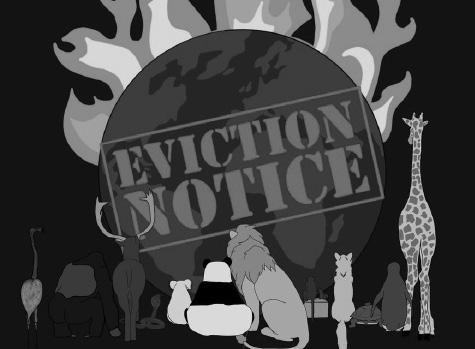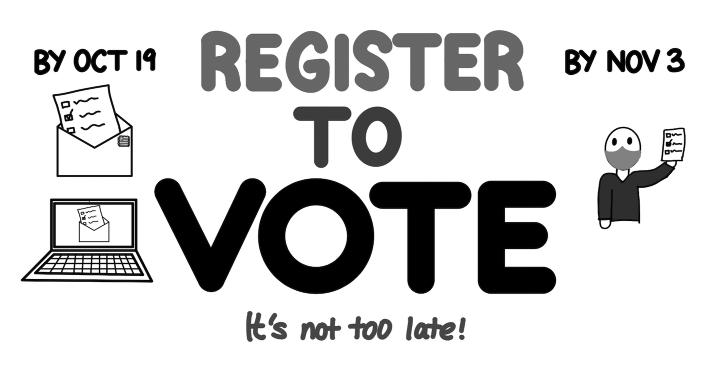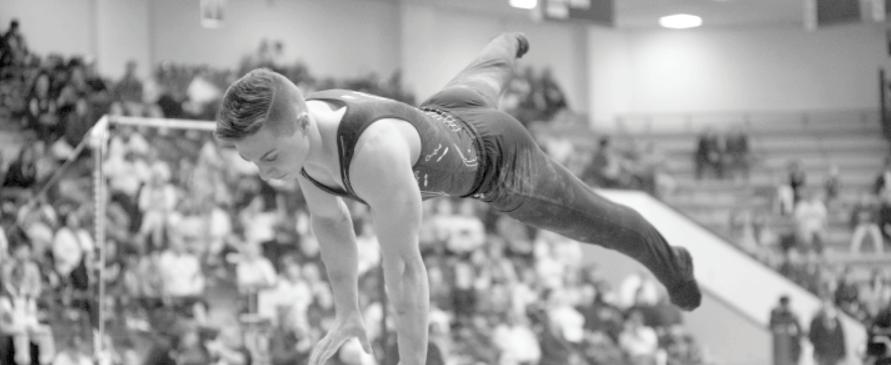
37 minute read
STATEMENT
from 2020-10-14
14 — Wednesday, October 14, 2020 statement
Ann Arbor: Not immune to the COVID-19 housing crisis
On the last Friday of August, Craig Teschendorf passed the day wondering where he and his puppy Eleanor would go after his eviction from the Orion MainStreet apartment complex in Ann Arbor. In a touching act of unity and protest, about 20 members from the area showed up to successfully postpone the eviction of the elderly disabled retiree. Photos from the event show a diverse, masked community successfully coming together to protect a vulnerable citizen of their city amid a pandemic. The protest was able to keep Craig off the streets until the end of September, when staff from the apartment complex and Ann Arbor police showed up to carry out the eviction. In an email, the Ann Arbor Tenants Union wrote that he is still looking for housing for him and Eleanor. Though Craig is becoming the face of the anti-eviction movement in the Ann Arbor area, evictions are still taking place across the nation no matter the coronavirus case count or the perils of wildfires, hurricanes and other aggressive weather. While the United States housing crisis did not start with the pandemic — in fact, it has been a decades-long problem — the circumstances of the pandemic have certainly exacerbated this growing issue. The economic toll of the COVID-19 pandemic has left millions both temporarily and permanently unemployed across the U.S. The national unemployment rate skyrocketed to over 14% in the beginning of summer and is currently projected to dip below 8%. Adding to the problem, the number of permanent job losses is increasing, creating a negative outlook on the job market as the U.S. continues to stagger through the economic consequences of the pandemic, left uncontrolled by an administration incapable of acknowledging and addressing the worst public health crisis in over 100 years. Irrespective of the abysmal public health policy of the 45th president, the Trump administration’s culture of downplaying the severity of the virus to the American public and refusal to follow Centers for Disease Control and Prevention guidelines are enough to impose blame for the state of the nation. All of this economic turmoil has resulted in an estimated 30 to 40 million Americans facing the threat of eviction, mounting debt, late fees and interest due to back rent and the legal consequences of unpaid rent, such as a wage garnishment if landlords sue to evict a tenant. In September, an unprecedented, nationwide eviction moratorium was declared by the CDC to protect renters and prevent the spread of COVID-19, but the effectiveness of this action is unknown as evictions continue to take place across the country, even in Ann Arbor, and landlords challenge the legality of the moratorium itself. Needless to say, the housing crisis is not exclusive to Ann Arbor, which is already one of the most economically segregated cities in
BY LEAH LESZCZYNSKI, STATEMENT COLUMNIST
the nation. Though over half of University of Michigan students come from the top 20% of American households and have differing levels of concern and parental support when it comes to paying rent, many students struggle to cover the cost of housing even without a pandemic and its crippling effects on the economy. While the fact that 78% of undergraduate credits are now offered virtually makes the need for housing in Ann Arbor less pressing, the obligations of student renters have remained intact for the most part. From all over the country and around the world, students flocked back to Ann Arbor in August to fulfill already-signed leases. With the fall semester underway, the issue of housing for the academic year may have faded in the list of students’ most pressing concerns. I spoke to Gayle Rosen, a landlord and tenant attorney for Student Legal Services, to learn more about student housing concerns amid the pandemic. She said that “(SLS) received hundreds of calls in the spring when U-M decided to move to online learning. Students headed home and said they wanted to break their lease because they no longer needed to stay in Ann Arbor in order to complete their schoolwork, or because they lost their jobs and could not afford their apartment. We have also heard from students who needed to return home to help care for a family member as a result of the pandemic.” After the University declared its plans for a “public-health informed” semester, “SLS received a lot of calls from students who wanted to terminate their leases for 2020-2021 because they decided not to come back (to campus),” Rosen said. Rosen acknowledged that for students, the problem is that there is not a strong legal basis to terminate their leases, even during a pandemic. Because leases do not often contain provisions that allow for an early termination due to an emergency, rent is still due and leases are still binding for many students, no matter how dire the circumstances. Needless to say, the housing crisis is just another straw on the camel’s back for many students juggling the typical stressors of college life that have intensified during the pandemic. To all the Ann Arbor landlords I spoke to over the phone, the public health and economic crises are not enough to convince them that desperate times call for desperate mea-
the Ann Arbor City Council, wrote of the painful truth of the housing crisis during COVID-19. “The pandemic definitely helped make many more people aware of this crisis but it did not cause it,” Disch said. Citing a 2015 study of American metros, Disch continued. “Ann Arbor has never been an inexpensive place to live but it is no exaggeration to say that we are currently facing a housing crisis,” she wrote. “Not only is Ann Arbor the eighth most economically segregated city in the nation — not Michigan but the nation — but ILLUSTRATION BY MAGGIE WIEBE we are second in the nasures, such as cutting rent or allowing rent- tion for excluding ‘esseners to terminate their leases under once-in-a- tial workers’ from living alongside the people century circumstances. Amid the crisis, there who depend on them.” have been heartwarming stories of landlords The University’s role in the Ann Arbor showing great empathy to renters, but these housing market is worth noting: “Over the last few instances are the exception, not the rule. 15 years, UM enrollment has grown by 8,557 According to an employee at Z West Apart- students, up 22%, while just under 6,000 beds ments who spoke to me on the condition of have been added between new apartments anonymity, students can break their leases and dorms in the downtown/campus area.” after paying six monthly installments. Google Where does the University expect these adReviews from May 2020 claim that McKin- ditional nearly 2,500 students to live? What ley Properties offered a 5% percent rent cut, does the University expect to happen to the which after its annual rent increase, did not cost of housing when students must compete seem very meaningful to tenants. In addition, with a growing Ann Arbor population for a I talked to a number of landlords who worked place to live, and they do not guarantee onto waive subleasing or late fees for a period of campus housing? time. Disch commented on the recent growth As described to me by many landlords over of the student population. the phone, their policies did not change due “I do think that the growth of enrollment to the pandemic because their tenants have and employment at the U (the problem is not had trouble paying rent, and did not ex- not just adding more students but adding press the need for rent concessions — so, there more jobs generally) have contributed to seems to be no reason to cut rent. If this is the the housing crisis but it is important not to case, the income of landlords, based in legally- lose sight of these long-term trends. We’ve binding leases, should be relatively stable. Yet been coasting along with an outdated vision several landlords have applied for financial of the city that has accelerated inequities support made possible by the Paycheck Pro- and reduced racial and economic diversity,” tection Program. she wrote.
Data from the U.S. Small Business Admin- The impacts of redlining and racial disistration shows many landlords in Ann Arbor, crimination are twisted into the economic in response to the pandemic, received low in- inequality seen throughout the country and terest, federally backed loans that may be for- become even more apparent during these given under certain circumstances. According crises. The disparities that make home ownto a data project from ProPublica, McKinley ership more difficult for Black and Hispanic Companies received between $5 and 10 mil- households compared to white people and lion, Cabrio Capital and Cabrio TNM Hold- eviction rates that put minorities at a larger ings received between $150,000 and $350,000 risk of ending up on the streets are insepaeach, Wickfield Properties between $350,000 rable from health and wealth inequalities and $1 million, Wilson White Company be- that are exacerbated by the pandemic. Actween $150,000 and $350,000 and Landmark cording to the CDC, “long-standing sysProperties, the nation’s top developer of stu- temic health and social inequities have put dent housing that has stakes in Z West, Z many people from racial and ethnic minorPlace and Foundry Lofts, received between $5 ity groups at increased risk of getting sick and 10 million. and dying from COVID-19.” Understanding If tenants are not having trouble paying the reciprocal relationships between ownrent, as high-rise complexes and landlords ing or having a stable place to call home, with houses across Ann Arbor told me over maintaining health and building wealth is the phone, why do these enormous compa- key to understanding the disproportionate nies need coronavirus bailout money? Where impact of the pandemic and the housing criexactly is it going? And who exactly is benefit- sis on minority communities. ting? I n an email, Lisa Disch, a professor in the Department of Political Science and Women’s Studies, and member of Read more at MichiganDaily.com ILLUSTRATIONS BY EILEEN KELLY
THE R.A. STRIKE WAS A LONG TIME COMING CONGRATULATIONS: YOU PAID YOUR RENT!
ISABELLE HASSLUND, STATEMENT DEPUTY EDITOR
The seemingly everlasting build-up to the Fall 2020 semester made me anxious about where I would live. My mind raced with questions as I was stuck in a state of limbo, full of unknowns. The hope that I would get to spend my senior year of college on a pandemic-free campus quickly dwindled and instead morphed into worry.
Should I give up my lease? Is it safe to move back? What seemed to be the safest option was not necessarily the most finan- Inevitably, the clause instilled in me an cially sound. Amid deciding, I, and many immediate fear and distrust of upper-level other students, waited eagerly to see what housing. Would I lose my room and board the University of Michigan’s plan would just because I disparaged the good name be. of Housing? Why did they want me to hide
As a former University-employed resi- my criticisms? What was I getting myself dent advisor for the last one and a half into? This sentiment lingered throughout years, my mind immediately wondered my time as a staff member, and I recently what the intended precautions would be learned that I was not alone in feeling this to ensure safe on-campus housing. My way. previous experiences with University During the pandemic and the strike, Housing made me feel like there would the aforementioned clause was a particube a disaster waiting for Residential Staff lar point of contention, and worsened the when they arrived for their training. Sure fear of retaliation. I spoke to a current R.A., enough, when I checked on my peers who asked to remain anonymous with fear during the August ResStaff training, they of retaliation from the University, over the were already starting to get concerned. phone about this ongoing battle. In this arIt seemed as if Housing had not come up ticle, they will be referred to as Sam. with an adequate plan to keep R.A.s and “Here we are now, with a bunch of leresidents safe during these unpredictable gitimate concerns that aren’t being adetimes. Rumors buzzed about facilities be- quately addressed by Housing, and yet our ing understaffed, and supervisors did not contract says we can’t talk to anyone about have answers to questions surrounding this but Housing,” they said. “We felt very safety precautions. trapped by that.”
This storm leading up the R.A. strike in This conflict grows even more complex early September was an explosion of ten- when we acknowledge that R.A.s exist in sion that existed even before the pandem- a gray area, where we are both students ic. Upper-level housing, which refers to and staff members of the University. And any full-time staff working in the Housing while I felt more like a student than a Unidepartment above the level of Hall Direc- versity employee, as soon as I left the contor, and R.A.s may have always had a hard fines of my room, I had to be there for my time finding common ground, but this residents. In everyday life, there weren’t time, this tension could cost the health distinct lines drawn between my two roles. and possibly the lives of Housing students This ambiguity has proven to be anand staff. other point of contention worsened by the
My personal animosity toward upper- pandemic. As a part of the strike agreelevel housing staff began from the moment ment, R.A.s were given priority for COof signing our contract called the Letter VID-19 testing; however, there was some of Appointment, referred to as the L.O.A. confusion as to the logistics of this because Every ResStaff member is tied to this of R.A.s’ unique standing. Sam described contract during their time as R.A.s. Any this tension and the obstacles it created. deviation from the included provisions “There’s a question on there that says: results in disciplinary actions consisting ‘What is your primary role in the Univerof anything from a conversation with the sity? Student, staff, faculty,’ and most of us hall directors — who are the R.A.s’ direct put: ‘student,’” they explained. “How are supervisors — or termination, depending (upper-level Housing) going to recognize on the severity of the behavior. that we are supposed to be getting prior-
I remember when I first walked into ity as ResStaff when, primarily, we’re stuthe West Quad Residence Hall Multipur- dents here?” pose Room, seeing my future fellow staff This hybrid position has also caused ismembers seated together in a circle. I was sues in the past, as we struggled to put our bright-eyed and eager to start making an academics, mental health and well-being impact on the incoming class. As we start- first, which sometimes interfered with my ed reading through our contract, a feeling relationships with my supervisors. I got of uneasiness settled into my stomach. I a taste of this conflict before I officially felt on edge about signing an agreement started my position as an R.A. that I had just gotten without much time Before starting the role, all R.A.s must to think. There is no room for negotia- take and pass a class called ALA 421 tion of the contract — it is an all or noth- where we learn to have open discussions ing deal. And even though we were able to about identity and analyze how our biases bring our concerns to our supervisors, we influence our interactions with others. knew we had to agree to the L.O.A. or be Prospective R.A.s sign up for a section of replaced by someone who would. ALA 421 at the beginning of a winter se-
While a lot of the L.O.A. is mundane de- mester, after they’ve registered for acatailing of hours and responsibilities, one of demic classes. Around the same time I the more gut-wrenching clauses reads: was meant to choose my ALA section, I
“I will not participate in discussions was cast in MUSKET’s production of “In or activities that in any way disparage my the Heights.” I was struggling to find an colleagues or supervisors or undermine ALA class that fit into both my class and their authority with residents. I will show rehearsal schedule. public support for all ResStaff decisions The Housing administrator suggested and University or Housing policies. If I that I choose between my love of performdisagree with a policy or decision, I will ing and the R.A. job. She explained that discuss it respectfully with my supervi- the job meant I needed to make substansors, but will continue to enforce the poli- tial sacrifices, refusing to acknowledge my cy unless directed otherwise.” role as a student who needs to engage in
As a journalist, it felt against my ethical extracurriculars and take time to do what code to agree to this. As a student, I felt as I love. The administrator told me that she if I should be able to take my grievances gave up dancing for her own career. But with Housing elsewhere if I feel like I am being an R.A. is not a career; it is, rather, a not being heard. No change comes without role with some benefits. In fact, many stucriticism and a little bit of pressure. I am dents need to have a job on top of ResStaff, someone who likes to use my voice when I as they are not getting a salary as an R.A. see something is wrong. To me, this came across as an effort to silence staff, keeping Read more at all issues handled quietly within Housing. MichiganDaily.com
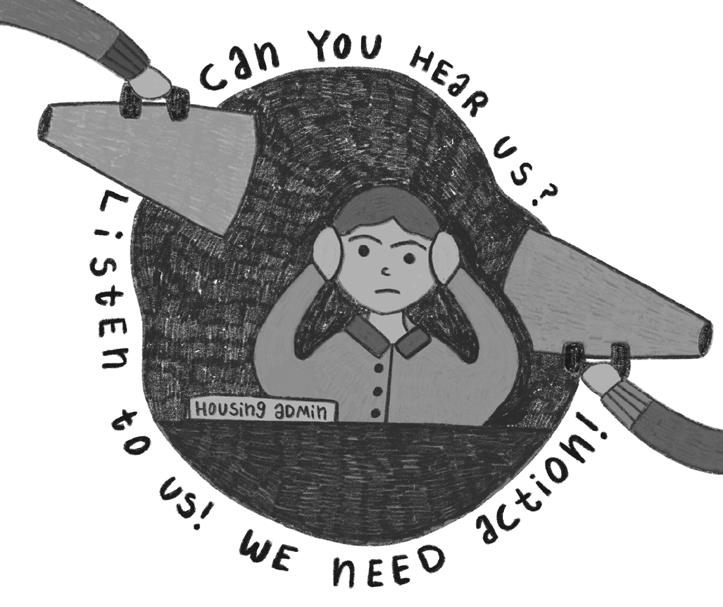
ALIX CURNOW, STATEMENT COLUMNIST
Rich students don’t like to talk about money. It can be embarrassing to express the amount of money in your bank account, especially when it’s money your parents wire to you. And it’s easy to avoid conversation about something you don’t think of much. But as a lower-income student, I think about money during almost all of my daily actions. When I wake up in the morning, I eat one egg instead of two to save on groceries. I rummage through Goodwill, searching for knockoffs of the fashions I see on Instagram, a practice I have perfected since middle school. My friends ask me if I want to go out to eat and I triple check my funds, indulging in some quick budgeting to see if I can afford dinner at a restaurant. I’m tired of not talking about money to make my wealthier friends more comfortable. I would be lying if I said I didn’t feel resentment towards them, as they tiptoe around the topic due to a lack of urgency. I’ve had a job for the last nine years of my life — since I was 12 years old — and I can’t fathom how some of them still don’t have jobs now. I need to work to pay my rent and quite honestly, it makes me angry that they don’t have to as well. Why does no one else talk about this? I’m starting to realize that it’s because most of the people at this university come from financially affluent households. And for the most part, rich people don’t like to talk about how rich they are. Worrying about how to pay my rent has been an issue since I moved out of my parents’ house in 2017. My parents no longer subsidized my living costs, and housing in Ann Arbor is notoriously expensive. As a full-time yet financially independent college student, I often face difficulty in figuring out how to afford it. Without friends around me who deal with the same obstacles, I often feel like I’m alone in my struggles. I’ve been feeling it a lot recently after early-voting “yes” on Proposal C , which is on the November 2020 Ballot. This proposal is asking voters to approve a new $1 million tax to fund construction, maintenance and acquisition of affordable housing units for low-income individuals. When talking about this proposal with my rich friends, I can tell they don’t quite realize just how dire the approval of this proposal is for low-income individuals like myself. When I asked my friend and fellow low-income student Amaya Farrell, a junior in the School of Kinesiology, if she was familiar with the proposal she said, “My whole life is my familiarity with the proposal.” Farrell is registered to vote in Wyandotte County, which subsequently means she can’t vote ‘yes’ on this Washtenaw County approval. However, she said that if she could she “would vote yes because of the segregation that income creates in Washtenaw County, specifically in the Ann Arbor area. Having affordable and equitable housing to individuals that can otherwise not afford their rent is crucial to diversity, equity and inclusion efforts made by the city.” Talking about our shared low-income familial upbringings is what has bonded me with Amaya since I met her in the summer of 2020. As with most of my low-income friends, lamenting about our frustrations with money is what has brought us closer together. Farrell was raised by her grandparents because her mother was in the military and her father was out of the picture. “I try not to ask (my grandparents) for anything now because I feel like I took a huge burden off of them by moving out,” Farrell said. This is not the first time Farrell has felt a sense of economic instability — it’s a feeling she’s experienced since she was young. “We were living paycheck to paycheck,” she explained about her upbringing. “We were evicted once. There were just a lot of hardships.” I felt a sense of myself when listening to her words. I rarely meet people at the University of Michigan with a similar familial experience as my own, and it was comforting to know that I wasn’t entirely alone. Relying on my low-income friends for support ILLUSTRATIONS in the many challenges we face regarding the BY EILEEN KELLY economic disadvantage between us and our high-income peers has been incredibly helpful. And though there are a significant number of studies regarding this topic, there is not a lot of action being taken to prevent this, despite our knowledge that this is a problem.
The facets of this reality far surpass solely the economic implications. Hours other students may spend studying are the hours I spend working tirelessly to pay my rent, yet I still beat myself up when I don’t perform as well as my wealthier peers in school. This was an issue I knew I’d face going into my freshman year of college, yet there were few resources to help me prepare for what would become a major stressor in my college life.
To afford the University of Michigan I applied for over 30 different scholarships. I was granted 20 of them, including the Michigan Competitive Grant. I reapply to some of these scholarships each year and some extend through all four years of schooling. It is through these scholarships that I was able to afford my spot in Bursley Residence Hall my freshman year. For sophomore year, I applied to live in the Inter-Cooperative Council (ICC) because it was the cheapest housing option I was aware of at the time. It certainly wasn’t my first housing choice.
I had a few friends offer for me to live at their house, but most of the prices they were mentioning were $850 or more a month, not including utilities, in the Kerrytown area of Ann Arbor. It agitated me that they could mention rent so casually. It was almost as if they didn’t have to think twice about it — probably because they didn’t.
There was absolutely no way I could afford the price of rent they were offering me, so I settled for the slightly-messy, overly populated cooperative house on South Campus. I loved living there, but I felt a sense of shame when I’d bring my upper-class friends over because my house wasn’t as nice as their high-rise apartments.
I distinctly remember one of them commenting on how dirty my house was compared to theirs. We were walking to my bedroom when they passed my kitchen, rife with unwashed dishes and leftover food on the counters. “Wow, I can’t believe you live like this,” they had said. I couldn’t help but think: Well, if I could afford to live in a cleaner environment, I would. I hated this feeling of embarrassment, but it’s something I have grown all too accustomed to as a lower-income student. Farrell explained experiencing the same feeling here on campus.
This year, with the thoughtful maneuvering of my friends, I am paying incredibly cheap rent in a house in Kerrytown. Yet, I still have to work at least 15 hours a week to pay my rent, which is minor compared to the three jobs I worked my sophomore year. Then, there were weeks when I was clocking in 40 hours between jobs in order to afford rent as well as groceries, phone bills and school supplies. Now, I babysit two kids for $20 an hour, but the frustration toward my peers who don’t work at all still persists. Every time I pay my rent for the month, I feel like I should get some type of award, or at least a congratulations.
I don’t think I’ve ever not thought twice about any purchase I’ve made. Nor do I think I ever will. And as difficult as it is, I do take an immense amount of pride in the fact that I am entirely independent of my parents, much like Farrell and other low-income students. This is a huge feat, one that I will never let anyone or myself diminish. It’s a significant obstacle and it’s not something we get praised for enough. So, if you’re like me and the struggle to pay your rent is consistent, then I offer you this: Congratulations. You did it. Affordable housing is a fight that I and many other low-income people have been grappling with our entire lives. I feel a sense of hope with proposals like Proposal C surfacing on our ballots: hope for a future when paying my rent isn’t a tireless battle, a future when a call from my landlord isn’t something to fear and a future when all lowincome people do not feel the overwhelming burden of finding a safe, supported home.
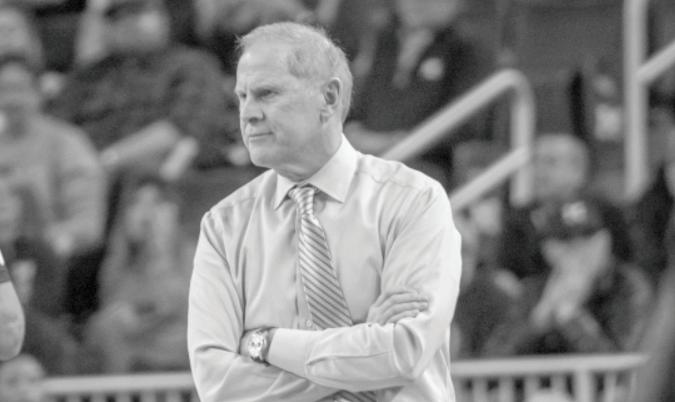
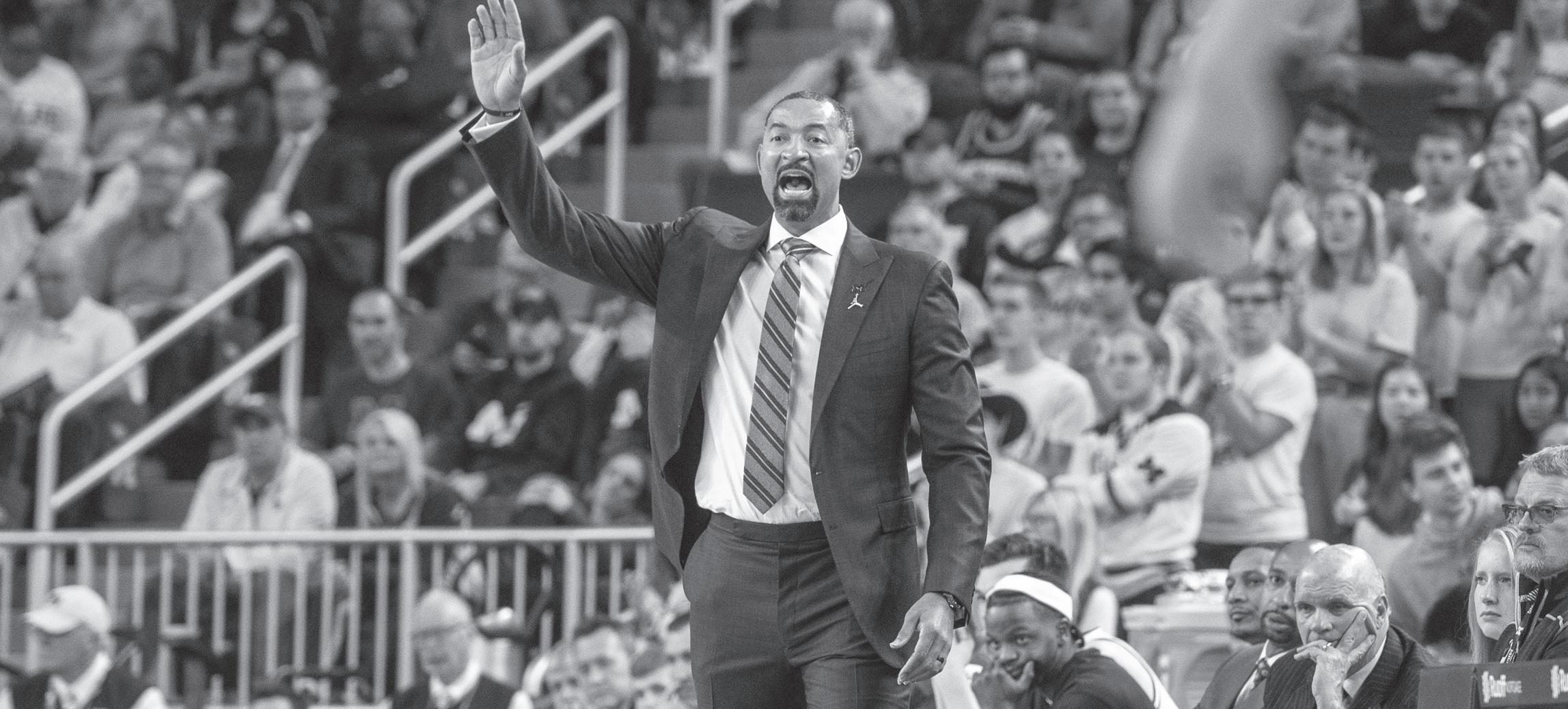
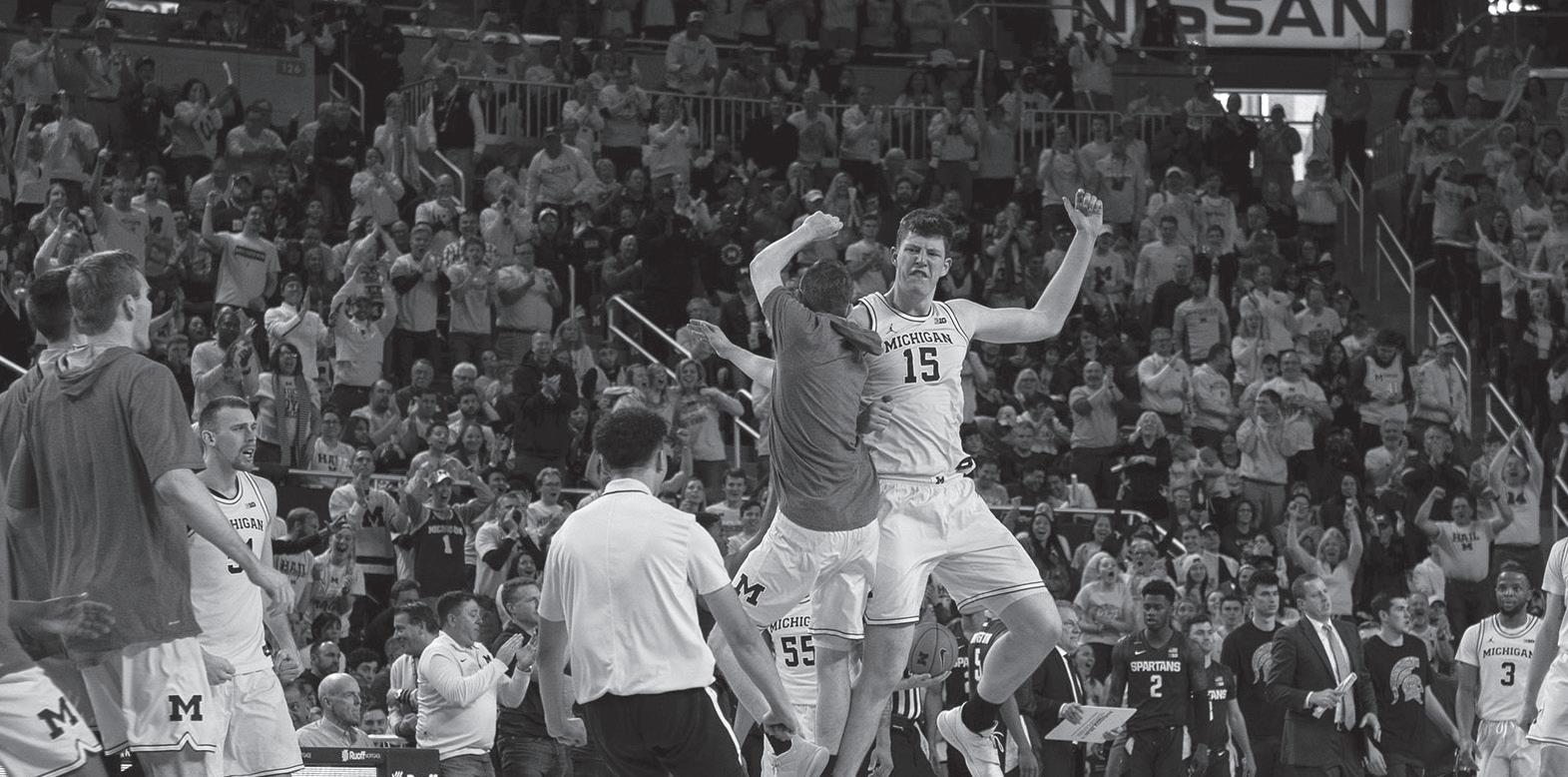
The Michigan Daily — michigandaily.com Sports Wednesday, October 14, 2020 — 17 Wolverines making progress physically and mentally as practice start looms John Beilein is back at home in Ann Arbor He gave a graduation address to the ***
ABBY SNYDER
School of Education in 2019, and It speaks volumes of Juwan Daily Sports Writer
when Dean Elizabeth Moje asked Howard’s success in his first season him if he’d ever be interested in as the Wolverines’ head coach that John Beilein’s press conferences teaching, the answer was absolutely when Beilein left Cleveland, there last January in Cleveland were — as soon as he was done coaching. was barely any talk — and none of it tense, a little gruff, almost defensive. When things didn’t work out in serious — of Beilein returning to his The NBA had not been kind to him, Cleveland, Beilein called Moje, and old role. and it showed. in a few months’ time, he found It’s a good thing, too, because That is not the John Beilein who himself the lead instructor of EDUC Beilein recognizes it as much as the spoke with The Daily on Tuesday 240. rest of us: Michigan is done with the afternoon, back in Michigan, where His coaching days may be over, Beilein era. It’s Howard’s program he became a beloved figure from but Beilein is hoping to have as now. 2007-2019. much impact on his students as he “I just have a lot of respect for The John Beilein of Tuesday once did on his players. In his spare Juwan and the team,” Beilein said. afternoon is relaxed. Happy. His time, he’s reading everything he “I don’t want to do anything that excitement is measurable as he can find on how to be an effective would be a distraction.” talks about getting to play tennis leader (never mind the dozens of But that doesn’t mean Beilein for the first time in seventeen years, basketball players who’ll tell you in doesn’t care about Michigan gleefully adding that his golf game a heartbeat that he already is one). basketball anymore. COVID-19 FILE PHOTO/Daily has improved like you wouldn’t It’s clearly prescient — the course restrictions have prevented him The Wolverines celebrate after scoring a crucial basket against the Michigan State Spartans last season. believe. He talks about getting to is titled “Coaching as Leading” — from attending any practices with spend time with his grandkids, his in workouts have been evident. Jon Sanderson to help curate smile practically audible through TEDDY GUTKIN He remarked that senior guard workout plans for the players to the phone.Daily Sports Writer Adrien Nuñez has become a more do while in quarantine. John Beilein has come home to physical and confident presence Martelli stressed, though, Ann Arbor, and it has made a world
While its season is not on the court, and senior guard that until they were cleared to of difference. scheduled to begin until Nov. 25, Eli Brooks has significantly workout in June, almost every *** the Michigan men’s basketball improved his basketball IQ. conversation between coaches If there’s one thing that team has been hard at work for Martelli also added that senior and their players focused on retirement has taught the months. forward Isaiah Livers has been a mental health, believing that it winningest men’s basketball coach
Official practices won’t begin stabilizing presence for the team was their utmost priority during in school history, it’s how to teach a until Oct. 14, but teams have as it prepares for the season, an unprecedented time. dog some new tricks. been permitted to work out both due to his ability to mentor “Everything during the I don’t say old dog, because together. younger players and perform pandemic was centered on their Beilein and his wife Kathleen have
“It’s been great to get guys well himself on the floor during mental and physical well-being,” recently adopted a puppy. In his back into the gym,” Michigan team scrimmages. Martelli said. “It just wasn’t the spare time, Beilein’s been reading up FILE PHOTO/Daily coach Juwan Howard said. While they may not be big time to talk basketball.” on dog training strategies — by my John Beilein has found an enjoyable new life in his return to Ann Arbor. “They’re looking forward to the names, Martelli made sure With the season’s tipoff just estimate, the puppy will be barking opportunity of getting better.” to mention that Howard has over one month away, Martelli at pick-and-rolls by Thanksgiving. but it doesn’t even begin to scratch the team as of yet, but provided
After having the rug pulled routinely taken a chance to looks forward to having a But Beilein has picked up some the surface of things Beilein wants he’s not stepping on anybody’s toes, out from underneath them break down plays and game chance to put the team’s hard new tricks, too. He’s teaching a class to learn about with all his newfound Beilein is more than ready to get just moments before their first film with his walk-ons, often work and mental preparation on at Michigan this semester, and, as a time. When he’s asked what he’s back to work in Crisler Center. Big Ten Tournament game going into the same amount of display on the court. While he result of the coronavirus pandemic, most excited about, he pauses for “If and when — I’m going to do against Rutgers, the Wolverines time and detail with them as he felt that the adjustment period it’s all online. So Beilein has learned several seconds trying to decide. it whenever I can possibly do it,” have been anxious to have an does with the team’s scholarship during and after the pandemic how to use Zoom, with some “I’m a lifetime learner,” Beilein Beilein said. opportunity to make some noise players. was a difficult one, Martelli says help from his graduate student says. “That will never stop. There’s He’s smiling through the phone in the postseason. Assistant “I told him that’s why he’s that he couldn’t be more excited instructor. all kinds of things. Knowledge is again. Beilein clearly still cares coach Phil Martelli admitted gonna be great at this (job),” to work with Howard, both But even with the technology powerful. And I’m always looking deeply about Michigan basketball. that the uncertainty over this Martelli said. “His care and the coach and the person, for a challenges, Beilein, who hasn’t for new ways to learn more about It’s what made Ann Arbor home. season prevented the team concern for each individual, second season. taught since he was a high school the world and how it works.” Even when he was the head from fully locking into summer person first, player second, is “It was different being home coach in 1978, is thrilled to get back But his excitement about coach in Cleveland, that was always workouts, but the NCAA’s mid- why I’m convinced he’s a star.” for four months,” Martelli said. in the classroom. learning doesn’t stop at the end of the case. And eventually, no matter September announcement Howard’s attention to “But the energy in recruiting “I’ve loved it,” he said. “I have a his lengthy reading list. Beilein is what the NBA brought, he was confirming a season would be walk-ons is reflective of his and the energy of teaching on whole new respect for the faculty, learning as much from the class as always going to come back someday. played has flipped a switch. commitment to caring for his the floor is laser vision for me in and all the preparation that you his students are, he says. “We never sold our house in
“There’s a vibe, there’s an players. During quarantine, he that I wanna be by his side when have to do, and how hard it is to do “Well, the Zoom thing is new,” he Ann Arbor — we didn’t even try excitement (now), about having kept in touch with the team over he coaches on a Monday night a Zoom class of 66 students as well. laughs. “But we’re reading all types to,” Beilein said. “We were going to a chance to pursue a Big Ten Zoom to check in on the well- in April. No one is destined to But I’ve loved every minute of it. of resources that we’re getting more sell it in the spring, but when things championship,” Martelli said. being of his players on a weekly do that, but if someone has the Teaching leadership, coaching, it’s information from, and the speakers didn’t work out in Cleveland, it was
According to Martelli, the basis. Howard and Martelli also ability to do it, I know for sure really empowering.” that we’ve had come in — you’re easy… We call Ann Arbor home. We improvements made by the team coordinated with strength coach that I’m in the right place.” It’s a natural next step for Beilein. always learning from them.” have for thirteen years.”
‘Why not me?’: For Juwan Howard, lack of Black coaches is personal
BRANDON TRACHTENBERG are being said out there that I truly Daily Sports Writer support.” That ability to relate to the
On May 30, 2019, the former struggles some of his players face Fab Five team member, NBA All- in this country is what makes it Star, two-time NBA champion and so vital to have more diversity in veteran NBA assistant teared up leadership roles. in front of reporters, family and Howard described a situation friends as he was announced as the where a player of his heard some 17th head coach of the Michigan deeply upsetting comments. While men’s basketball team. he wouldn’t share specifics out of
His raw emotion revealed the respect for his player’s “respect magnitude of the situation. Juwan and privacy,” it was a situation Howard joined a small group of where many head coaches could Black coaches in college basketball, have felt overwhelmed. becoming one of 14 Black head Not Howard. coaches in basketball’s six major Howard and other Black head conferences, as of 2019, and the only coaches are able to fathom some Black head coach in the Big Ten. of that adversity because they have
The lack of Black representation personally experienced it. Not in leadership roles in college to mention more diverse leaders basketball is especially striking in a also bring fresh perspectives and sport where the majority of players ALEXANDRIA POMPEI/Daily different viewpoints. are Black — 53.6% of all men’s DI Michigan men’s basketball coach Juwan Howard is one of just 14 Black head coaches in college basketball’s six major conferences. “It’s important for me,” Howard players. said, “that knowing that I am a
“I am the only Black head coach wanted the job the most. representation among players Returning to the hiring of Juwan Despite all Howard has public, national figure, that when in the Big Ten, which I’m very “If I’m going to take a risk with would translate to coaching staffs. Howard, it becomes more complex accomplished, doubt still circled people hear me speak, especially proud of,” Howard told The Daily. somebody,” Warde said during Players, logic should dictate, have considering he was pitched as a around his hire and still does, the young ones who can identify “I don’t understand why there isn’t Howard’s introductory press the requisite eye and experience candidate with a lack of experience even in the face of the success he and look just like me, to be inspired more but … I’m just gonna try and conference last year, “I’m going to to truly understand the game. and received a lot more criticism accomplished last year. by someone like myself, ... (to show) do the best job I possibly can for the take that risk with Juwan Howard.” However, as is well-documented, than some of those white NFL head “As a Black skin, some folks think if I did it, they could do it too.” University of Michigan to help spear Manuel’s confidence in Howard that is not the case. coaches. that you’re not qualified enough,” For becoming a leader to be our student-athletes to become gave him the comfort to go ahead In the NFL, for example, a “Why not me?” Howard said. Howard said. “I think that’s the a tangible goal, people need to successful within basketball, but and do his job to the greatest ability majority of players are Black, but in “Why, how (am) I not considered ignorance that we have to ignore see others in those roles that more importantly successful in life.” he could. the past three years, only two of 19 to be qualified for a position like and continue to keep driving and look like themselves. In this way,
It was his desire to do more than Looking back after the first year open head coaching positions have this? Especially someone who (has) doing whatever to be the best Howard serves as a role model for just win but also to make an impact under Howard’s reign, the “gamble” been filled by Black coaches. Many loads of experience as a player, person of ourselves no matter what hundreds of thousands of young on his players and the community paid off as the Wolverines finished of the new hires were first time head played the game of basketball since people may say or think.” Black individuals. He knows that that appealed to athletic director with a 19-12 winning record and a coaches, jumping straight from he was six years old, played on the These opinion-driven stigmas he has to set a good example and Warde Manuel — one of 12 Black top-15 recruiting class. coordinator roles or other assistant professional level for 19 years, and about Black leaders serve as a brutal encourage them to chase their athletic directors in the Power 5 However, there was another roles or even making their first NFL also coached on the NBA level for reminder of how much more work dream no matter what people tell Conferences. explanation for the controversy over appearances coming straight from six years. … I have also played here needs to be done for the fight against them, especially in a job where he
“I just thought he was a genuine Howard’s hire bubbling beneath the the college-level. at the University of Michigan and racial injustice. And as protests and represents a small minority. person,” Manuel said on the ‘In surface. Candidates hired with a lack of played three years and been very marches over the past few months The lack of Black representation the Trenches’ podcast in 2019. “(There’s) this perception out experience is odd considering the successful all three years, been to have shown, that change is being in leadership roles, specifically “Just a down-to-earth, very smart here when you are a Black coach wealth of potential Black candidates the championship game two years fought for right now. coaching, is one that will not be (person). (He) had really educated (that) you’re not as qualified as with plenty of experience. Consider in a row, been to the Final Four two Howard understands the solved overnight. But, Howard himself about the college game. He some of the other coaches who are Kansas City Chiefs offensive years in a row. I am very qualified.” gravity of this moment and will says, the magnitude of this knew about me. … What struck me from a different race,” Howard said. coordinator Eric Bieniemy — who Someone with the resume of continue to support his players and problem can’t serve as a deterrent. was how genuine and how humble “I think that’s so sad that folks have has over 20 years of experience Howard’s should be on the top of the messaging that he believes in. Change needs to happen, whether he was as a person. He didn’t that narrow-minded and (are) so in the NFL as a player and a coach the list when it comes to a head “Listening in has been great,” it’s by implementing affirmative walk in wearing either one of his ignorant, in a way.” — coming off one of the greatest coaching role. He is someone who Howard said. “To know that action rules like the Rooney Rule championship rings.” The lack of Black leaders in sports offensive seasons in NFL history has played with and been around where we are as a country, we have in the NFL or simply giving others
Critics hinged on Howard’s — like basketball, where a majority and a Super Bowl win. Bieniemy, some basketball’s greatest minds a lot of work to do, but knowing a chance. lack of experience as a head coach, of the actual athletes are Black — like many others, was overlooked. and players: LeBron James, Pat the fact that our future is in great As Howard has shown, there but that did not matter to Manuel. proves that discrimination still It’s hard to say if race is a main Riley, Dwyane Wade, Steve Nash, hands with student-athletes are many capable individuals out He just wanted the most capable plays a huge part in hiring decisions. reason in these decisions, but it’s Dirk Nowitzki, Jeff Van Gundy, that are fighting to help promote there. And sometimes, that chance candidate and the person who In an idealized world, that hard to deny that it plays a role. Tracy McGrady and Doc Rivers. change. There are great ideas that is all they need.

